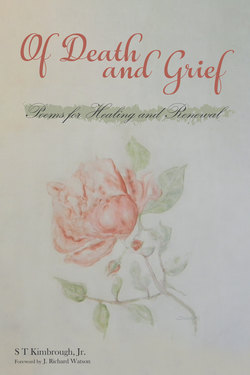Читать книгу Of Death and Grief - S T Kimbrough - Страница 6
На сайте Литреса книга снята с продажи.
Foreword
ОглавлениеWhen S T Kimbrough Jr.’s wife Sarah died after a happy marriage of fifty-nine years, he sought, as all who have lost loved ones do, to try to come to terms with what had happened. He did so by writing the following poems. They record the emotions of a strong man almost overcome by grief, holding on to whatever comfort he can find. Sometimes that comfort came by putting his emotions into verse, trying to find words that would express his grief, the dreadful lying awake in the night, alone (that lying awake is memorably explored here in “Sleeplessness, Grief’s Torturous Friend”). Sometimes it came from the consciousness of something else, a mysterious feeling that somehow the response to death is related to love, and the memory of that love is all-consuming, even in the face of death. Memory, as Kimbrough writes in “Grief’s Redemption,” is like a dove, the gentlest of birds:
Grieve on, brave heart, for in grief
there is hope, there is belief
that memory like a dove
alights on the heart with love.
The pain of parting is terrible; the memory of the moment of farewell is so painful, a moment that is captured here in the restrained simplicity of
It was fifty-nine years ago
that I saw her for the first time.
A month ago I saw her for the last time
and kissed her lips for the last time as she died.
Memory and pain and love come together. As Emily Dickinson put it:
Parting is all we know of heaven,
And all we need of hell.
The feeling of disaster and loss at the end of a beautiful relationship will never go away. And yet there is gratitude for what has been, for the mystery of the last days, for the care received against the inevitable process of dying, and for the presence in the room of something other-worldly in the wonder of the final precious days and hours. And then comes the reality. One of these poems records the attempts of others to console, seen against the misery of turning the key in the front door. When they say “How are you,” they ought to know how hard it is, each day to enter an empty house, but
The simple words, “You’re in my thoughts”
suffice beyond all measure.
These poems indicate something that we all know, but often lack the courage to explore, the intimate relationship between love and grief: that the more one loves, the more one grieves when that love is brought to an end by death. And yet, as these poems show, love continues to exist, in the continued presence of the beloved in the mind and the heart. As one of these poems says:
Give thanks for love, for being—
for life, feeling, and seeing.
“For being.” The phrase is simple, yet exactly right. Just “being” is a gift that we need to remember to give thanks for. And somehow, that love continues through all the accidents of life, and through the final moment of death. It is not easy to say how this happens. We may believe in heaven, and that we shall meet again on another shore and in a greater light, or we may not. But whether or not we have such a belief, there is a sense that love continues beyond the last embrace, or the last kiss on the forehead. Death is a farewell, but one in which we carry with us the knowledge that parting is in some ways impossible. It is like the end of Sarah Doudney’s beautiful hymn, “Sleep on belovèd, sleep, and take thy rest”: “Good night! Good night! Good night!” Doudney’s note reminds us that the early Christians were accustomed to bid their dying friends “Good night”; and that hymn carries with it the thought that has been a part of the encounter with death for more than a thousand years: Requiescat in Pace, “Rest in Peace.” And yet it also has the simplicity of a familiar action, the last words spoken before going to sleep. The ordinary words of daily life are used here to say a last farewell: it is part of the way in which life and death, love and grief, are inextricably and mysteriously combined.
These poems are a moving personal record of a precious relationship. But they are also addressed to all those who are striving to come to terms with loss and bereavement. This little book will be to those who mourn, a comfort to the brave hearts who grieve at a time that we all have to face at some point in our lives.
J. Richard Watson1
Durham, UK
1. J. Richard Watson is Emeritus Professor of English, University of Durham, UK, and a long-time friend of Dr. S T Kimbrough, Jr.
